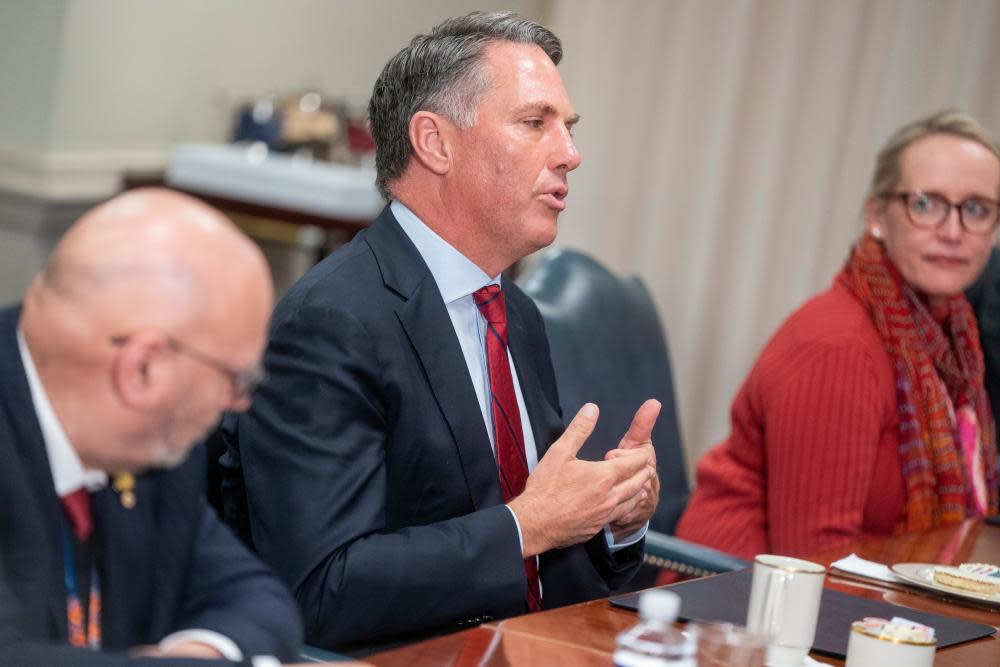US hails progress in getting Australia nuclear-powered submarines ‘at the earliest possible date’

Australia and the US have made “significant progress” towards getting Australia a fleet of nuclear-powered submarines “at the earliest possible date”, the US defence secretary, Lloyd Austin, said on Saturday.
The federal government is set to announce its Aukus submarine plans by the end of March, amid mounting concerns that the US could struggle to provide them, and a push for President Joe Biden to fast-track research into submarines that use non-weapons grade uranium.
Austin met the defence minister, Richard Marles, in Washington on Saturday (Australian time) to discuss the Aukus pact between Australia, the US and the UK, as well as regional security and other issues.
Related: Aukus: Biden urged to fast-track research into submarines using non-weapons grade uranium
They also talked about the upcoming public release of the defence strategic review during a bilateral meeting at the Pentagon.
Austin said that, at a December meeting last year, he and Marles had agreed to deeper defence cooperation, to strengthening coordination on regional priorities, and to increasing climate change resilience.
“We also pledged to find new ways to work closely with Japan, as we pursue a common vision of a free and open Indo-Pacific, as a region where all countries can chart their own course and all states respect international rules and norms and where all disputes are resolved peacefully,” Austin said.
“All of this is yet another reminder that our unbreakable alliance is capable of great things. It has, indeed, endured for generations, and it remains vital to regional peace and security.”
Sign up for Guardian Australia’s free morning and afternoon email newsletters for your daily news roundup
Before the meeting, he said the discussion would help the nations “make further progress in our alliances and trilateral reach with Aukus”.
“We’ve already made significant progress on developing the optimal pathway for Australia to acquire a conventionally armed, nuclear-powered submarine capability at the earliest possible date,” he said.
Marles called it an “excellent meeting”.
An excellent meeting with my good friend @SecDef in Washington today.
Plenty to discuss ahead of a big year of Australia-US cooperation including AUKUS. pic.twitter.com/CR5RfOeCeP— Richard Marles (@RichardMarlesMP) February 3, 2023
He also conceded building up the nuclear workforce was “one of the real challenges we face”, according to the Nine newspapers. Another challenge was America’s bureaucracy around exports, which could delay the transfer of technology.
The US and UK would benefit from the Aukus deal as well as Australia, he said, calling it a “three-way ecosystem”.
The meeting took place just before a second Chinese spy balloon was spotted. The Pentagon tracked the first as it flew over the US mainland, then confirmed a second one had been seen over Latin America.
US officials made it clear they did not believe China’s claim it was a weather balloon that had blown off course, and there was immediate diplomatic fallout, with the US secretary of state, Antony Blinken, delaying an imminent trip to China.
Marles said China had questions to answer over the intrusion.
According to the Australian Financial Review, Marles said he did not know more about the balloon than what was already public, and that he was unaware of anything similar ever flying over Australia.
“There are a lot of questions associated with it, which I think everyone has. We all want the answers to those questions from China,” he said.

 Yahoo Movies
Yahoo Movies 
